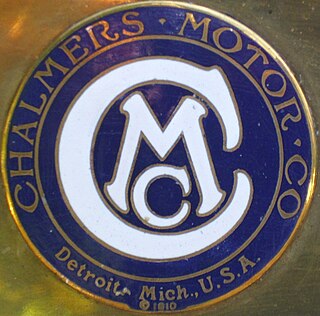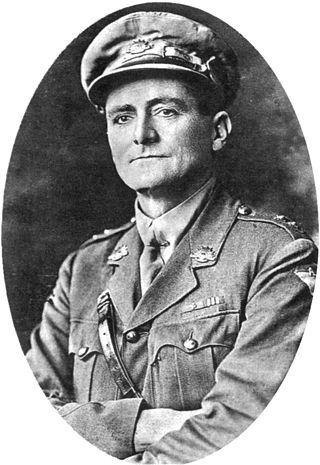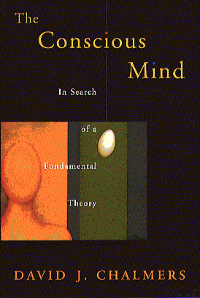
Chalmers University of Technology is a private research university located in Gothenburg, Sweden. Chalmers focuses on engineering and science, but more broadly it also conducts research and offers education in shipping, architecture and management. The university has approximately 3100 employees and 10,000 students.

The Chalmers Motor Company was an American automobile manufacturer headquartered in Detroit, Michigan. Founded in 1908 by Hugh Chalmers, the company was known for producing high-end vehicles. Chalmers automobiles gained recognition for their toughness, durability, and engineering receiving particular praise for their performance in touring events. The company reached its peak in 1911, becoming the eighth-largest auto producer in the United States. Despite initial success, the company faced challenges with increasing competition in the auto industry, and sales began to decline in the following years. In 1923, Chalmers Motor Company merged with Maxwell Motor, ultimately forming the basis for the Chrysler Corporation.

George Chalmers was a Scottish antiquarian and political writer.

The Saxon Motor Car Company was located in Detroit, Michigan, from 1914 to 1922. In 1917, 28,000 cars were made, making it the seventh largest car maker in the United States.

The New Jersey Pine Barrens, also known as the Pinelands or simply the Pines, is the largest remaining example of the Atlantic coastal pine barrens ecosystem, stretching across more than seven counties of New Jersey. Two other large, contiguous examples of this ecosystem remain in the northeastern United States: the Long Island Central Pine Barrens and the Massachusetts Coastal Pine Barrens. The name pine barrens refers to the area's sandy, acidic, nutrient-poor soil. Although European settlers could not cultivate their familiar crops there, the unique ecology of the Pine Barrens supports a diverse spectrum of plant life, including orchids and carnivorous plants. The area is also notable for its populations of rare pygmy pitch pines and other plant species that depend on the frequent fires of the Pine Barrens to reproduce. The sand that composes much of the area's soil is referred to by the locals as sugar sand.

Albert Chalmers Borella, VC, MM was an Australian recipient of the Victoria Cross, the highest award for gallantry in the face of the enemy that can be awarded to British and Commonwealth forces. Born in Victoria, Borella was one of 64 Australians to receive the Victoria Cross for their actions during the First World War, doing so while serving with the 26th Battalion around Villers-Bretonneux in July 1918. After the war, Borella returned to Australia, initially farming a property in Victoria before rejoining the Army during the Second World War and serving in a number of garrison units in Australia. He was demobilised in 1945 and worked as a public servant until he retired in 1956. He died in 1968 at the age of 86.

Asgiriya Stadium, is a cricket ground located in Kandy, Sri Lanka. Uniquely owned by Trinity College, Kandy, it is conveniently situated a short distance away from the city centre. Historically, it was a prominent venue for Test matches when international teams toured Sri Lanka. Asgiriya gained fame as the country's second Test cricket ground in 1982–83 when it hosted Greg Chappell's Australian team, following in the footsteps of the Paikiasothy Saravanamuttu Stadium.

Chalmers Jack Mackenzie, was a Canadian civil engineer, chancellor of Carleton University, president of the National Research Council, first president of Atomic Energy of Canada Limited, first president of Atomic Energy Control Board and instrumental in the development of science and engineering education in Canada.

The Main South Line, sometimes referred to as part of the South Island Main Trunk Railway, is a railway line that runs north and south from Lyttelton in New Zealand through Christchurch and along the east coast of the South Island to Invercargill via Dunedin. It is one of the most important railway lines in New Zealand and was one of the first to be built, with construction commencing in the 1860s. At Christchurch, it connects with the Main North Line to Picton, the other part of the South Island Main Trunk.

John George Chalmers was an American football, basketball, and baseball coach. He served as the head football coach at Franklin & Marshall College (1902), the University of Iowa (1903–1905), Columbia College in Dubuque, Iowa, now known as Loras College, (1907–1914), and the University of Dubuque (1914–1924), compiling a career college football record of 100–47–8. Chalmers was also the head men's basketball coach at Iowa for one season (1904–1905), tallying a mark of 6–8, and the baseball coach at Iowa for two seasons (1904–1905) and at Columbia College from 1915 to 1921.

Robert Chalmers, 1st Baron Chalmers, was a British civil servant, and a Pali and Buddhist scholar. In later life, he served as the Master of Peterhouse, Cambridge.

Agnes Christine Johnston was an American screenwriter who wrote for more than 80 films between 1915 and 1948.
The Spirit of Adventure is a 1915 American short film directed by B. Reeves Eason.

Sir Peter Chalmers Mitchell was a Scottish zoologist who was Secretary of the Zoological Society of London from 1903 to 1935. During this time, he directed the policy of the Zoological Gardens of London and created the world's first open zoological park, Whipsnade Zoo.
John Chalmers, GC was a New Zealand-born Australian exchange recipient of the George Cross, the highest decoration for gallantry awarded to civilians or to military personnel for actions "not in the face of the enemy" in the United Kingdom and Commonwealth. A member of the North Bondi Surf Life Saving Club, Chalmers was awarded the Albert Medal in 1922 for his actions in rescuing a swimmer during a shark attack at Coogee Beach. With the establishment of the George Cross, the Albert Medal was discontinued and, in 1971, living recipients of the decoration were invited to exchange their medal for the George Cross; Chalmers took up the offer and formally became a recipient of the George Cross.

The Conscious Mind: In Search of a Fundamental Theory was published in 1996, and is the first book written by David Chalmers, an Australian philosopher specialising in philosophy of mind. Although the book has been greatly influential, Chalmers maintains that it is "far from perfect", as most of it was written as part of his PhD dissertation after "studying philosophy for only four years".

The Fremantle tramway network linked the central business district of Fremantle, the port city for Perth, Western Australia, with nearby suburbs. Small but comprehensive, it operated between 1905 and 1952. It was not connected with the larger Perth tramway system.
Barren Earth is a Finnish progressive death metal band from Helsinki, formed in 2007. Their music is said to be a combination of death metal, progressive rock, and folk music, pulling influence from the different groups each member is associated with. Since their formation, the band has released one EP and four full-length albums.

The Moving Picture World was an influential early trade journal for the American film industry, from 1907 to 1927. An industry powerhouse at its height, Moving Picture World frequently reiterated its independence from the film studios.
The 1915 Sinhalese-Muslim riots was a widespread and prolonged ethnic riot in the island of Ceylon between Sinhalese Buddhists and the Ceylon Moors. The riots were eventually suppressed by the British colonial authorities.















